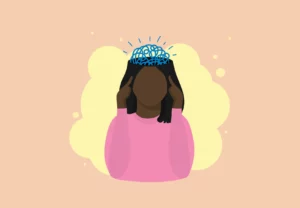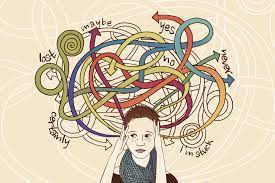Do you find yourself constantly overthinking things? Do you lie in bed at night going over and over the same conversation or situation, trying to find a different outcome? If so, you may be struggling with the overthinking disorder. This is a condition that affects many people and can hurt their lives. In this blog post, we will discuss what overthinking disorder is, as well as strategies for how to stop overthinking and start living your life!
Contents
What Is Overthinking Disorder?
 The overthinking disorder is a condition where someone gets caught up in their thoughts and can’t let go. It can be a reaction to stress or anxiety, or it can be its own condition. It is also known as rumination. People with overthinking disorder obsess about their problems and replay them over and over in their minds.
The overthinking disorder is a condition where someone gets caught up in their thoughts and can’t let go. It can be a reaction to stress or anxiety, or it can be its own condition. It is also known as rumination. People with overthinking disorder obsess about their problems and replay them over and over in their minds.
It is believed that overthinking might be a form of self-protection. By constantly thinking about potential problems, you are less likely to be surprised by them. However, this way of thinking can take over your life and make it hard to enjoy the present moment. It can also lead to anxiety and depression.
If you are someone who is always overthinking, you should understand that you are not alone. Many people suffer from this condition. The good news is that there are things you can do to stop overthinking and start living. So do not catch up in your thoughts and take action today.
What Does Overthinking Look Like?
It is not always easy to identify when or what we are overthinking. It can manifest in different ways for different people, but there are some common symptoms to see how overthinking look like:
- Ruminating or obsessing over past events, replaying them in our minds over and over.
- Have difficulty making decisions because we second guess ourselves or worry about what could go wrong.
- Plagued by “what if” scenarios, imagining all the ways things could go wrong in the future.
- Focus on the negative aspects of a situation and filter out the positive.
- Have trouble letting go of things and moving on.
- Constantly seek approval or validation from others.
- Worry about what other people think of us.
- Feel like we are not good enough or that we do not measure up.
These are common symptoms, but it is important to remember that everyone experiences overthinking differently. For example, someone with OCD might have very different symptoms than someone with GAD. If you are unsure if your symptoms are due to overthinking, it is important to speak with a mental health professional who can help you figure out what is going on.
Also, remember that overthinking can be associated with other mental health conditions, so it is important to get help if you are struggling. If you think you might have an overthinking disorder or any other mental health condition, please reach out to a professional for help.
Is Overthinking Disorder A Mental Illness?
 Generally speaking, overthinking is not a mental illness. However, for some people, it can become a problem that interferes with daily life. When this happens, it might be time to seek help from a mental health professional.
Generally speaking, overthinking is not a mental illness. However, for some people, it can become a problem that interferes with daily life. When this happens, it might be time to seek help from a mental health professional.
In some cases, where overthinking is accompanied by other mental health issues like anxiety or depression, it might be classified as a disorder. Overthinking can also be a symptom of OCD (obsessive-compulsive disorder).
So, yes, overthinking can also be classified as a disorder, but this is usually only the case when it’s accompanied by other mental health issues. Otherwise, it can be seen as a bad habit that can be changed with the right mindset and some effort.
If you’re struggling with overthinking, remember that you’re not alone. Seek help from a mental health professional if needed, and start working on changing your thinking patterns today. With the right help, you can overcome overthinking and enjoy your life simply!
What Causes People To Overthink?
Well, the causes of overthinking are usually combinations of different things. Let’s discuss a few common causes and possible triggers of overthinking.
Psychological triggers
It is believed that overthinking is a psychological condition. Here are some psychological triggers that might cause someone to overthink:
- Anxiety: Anxiety is a mental health disorder characterized by fear and worry. People with anxiety often have intrusive thoughts and concerns about things that could go wrong.
- Perfectionism: Perfectionists tend to be highly critical of themselves and others. They set high standards and are never satisfied with anything less than perfection.
- Low self-esteem: People with low self-esteem often doubt themselves and their abilities. They might worry about what other people think of them or whether they are good enough.
These are just a few of the psychological triggers that can cause someone to overthink. Certain medical conditions can also play a role in the development of the overthinking disorder. These include:
- Attention deficit/hyperactivity disorder
- Depression
- Obsessive-Compulsive Disorder (OCD)
- Post-traumatic stress disorder (PTSD)
Physical factors
 In this, the individual may be more prone to overthinking if they have a history of physical or sexual abuse, neglect, or trauma. Individuals who grew up in chaotic or unstable households may also be more likely to develop an overthinking disorder. Some common factors are:
In this, the individual may be more prone to overthinking if they have a history of physical or sexual abuse, neglect, or trauma. Individuals who grew up in chaotic or unstable households may also be more likely to develop an overthinking disorder. Some common factors are:
- Lack of sleep: It is hard to think straight when you are exhausted. If you are not getting enough sleep, your body and mind will be more prone to anxiety and overthinking.
- Caffeine: Caffeine is a stimulant that can increase anxiety and make it harder to focus.
- Alcohol: Alcohol is a depressant that can make it difficult to process information and make decisions.
- Dehydration: Sometimes, when we are dehydrated, our brain doesn’t work as well. This can lead to anxiety and overthinking.
If you find that you are overthinking things on a regular basis, it may be helpful to talk to a therapist or counselor who can help you learn healthy coping mechanisms.
Stressful life events
Some life events are just naturally stressful. These include things like:
- Starting a new job
- Getting married
- Having a baby
- Prolonged stress
- Hormonal changes
It’s normal to feel some anxiety during these times. But if you’re constantly worrying and obsessing over every little detail, it can be tough to enjoy the experience. For example, you might be so focused on making sure everything is perfect for your wedding that you don’t actually enjoy the day.
Overthinking is a common problem that plagues many people. If you’re someone who overthinks, you might be wondering what causes this behavior. After all, it can be quite frustrating to constantly be stuck in your own head.
Unfortunately, there is no one-size-fits-all answer to this question. However, there are some potential causes of overthinking that might help you understand your behavior better.
How To Overcome Overthinking Disorder?
 There are several ways that you can overcome the overthinking disorder. Below are some popular methods or tips to help you:
There are several ways that you can overcome the overthinking disorder. Below are some popular methods or tips to help you:
Identify your triggers
It is important to know what situations or events trigger your overthinking. Once you are aware of these triggers, you can start to avoid them or be prepared for them. For example, you might need to leave a situation that is making you feel anxious or stressed. Some people might avoid identifying their triggers because they think it will make their overthinking worse, but it can actually be very helpful.
Talk to your loved ones
Talking to those who are close to you can be very therapeutic. When you overthink, you tend to bottle up your emotions and thoughts. This can lead to anxiety and depression. Talking to your loved ones can help you release some of the pent-up thoughts and feelings. They can also offer support and understanding.
Write it down
If you’re prone to overthinking, one of the best things you can do is to write down your thoughts. Get a journal and start writing down your thoughts because writing down your thoughts can help you to see them more clearly and objectively. This can also help you to start to let go of them. In fact, studies have shown that journaling can help to reduce stress and anxiety.
Challenge your thoughts
Once you have identified your negative and anxious thoughts, you can start to challenge them. Ask yourself if there is evidence for or against your thoughts.
- Are they realistic?
- Are they helpful?
- Are you overgeneralizing?
For example, if you are thinking “I’m such a failure,” ask yourself if that is really true. And simultaneously challenge with is “I’m not a failure.” This can help you to start to see things in a more balanced way.
Practice relaxation techniques
Relaxation techniques are a great way to help you stop overthinking. When you’re feeling anxious or stressed, take a few minutes to yourself to do some deep breathing exercises, stretch, or meditate. This will help you to clear your mind and relax your body. You should start to feel better almost immediately.
Maintain healthy lifestyle
This is always an important factor in managing any mental health condition, but it is especially important when trying to manage the overthinking disorder. These include:
- eating a balanced and healthy diet
- getting enough sleep
- staying hydrated
- exercising regularly
- managing stress levels
All of these things help to keep the body and mind healthy, which in turn helps to manage the overthinking disorder.
These are some common sense things that can be easy to overlook when someone is in the throes of overthinking, but they are important nonetheless. Of course, there are also some specific things that can be done to help manage the overthinking disorder.
Is Professional Help Needed?
 If you’re finding that overthinking is causing you significant distress or interfering with your daily life, professional help may be needed. Also, consider seeking help if you find that self-help strategies aren’t working or if you’re having suicidal thoughts.
If you’re finding that overthinking is causing you significant distress or interfering with your daily life, professional help may be needed. Also, consider seeking help if you find that self-help strategies aren’t working or if you’re having suicidal thoughts.
There are many effective treatments for this disorder, a few common lists are described below:
- Cognitive behavioral therapy (CBT): CBT is a type of therapy that helps you identify and change negative thinking and behavior patterns. It works by helping you understand how your thoughts and behaviors impact each other.
- Interpersonal therapy (IPT): IPT focuses on improving communication and relationships. It can help you identify and change negative patterns in your relationships.
- Medication: Medication can be used to treat the symptoms of the overthinking disorder, such as anxiety or depression. Medication can also be used to help with sleep problems.
If you’re considering professional help, it’s important to find a therapist or doctor who is experienced in treating this disorder. You can ask your primary care doctor for a referral, or you can search for a therapist online.
Overall, you just need to look around, there is always help available and people who want to help you. You are not alone in this battle against overthinking!
Conclusion
To conclude, the overthinking disorder is often caused by negative thinking patterns, perfectionism, and anxiety. If you find yourself overthinking, try to reframe your thoughts using positive affirmations. Also, practice mindfulness and meditation to help you become more aware of your thoughts.
Finally, reach out to a therapist or counselor if you need additional support in managing your overthinking disorder. With the right help, you can learn how to stop overthinking and start living a more peaceful and fulfilling life.
For more information and guidance please get in touch with our expert therapists at Therapy Mantra. They will be more than happy to assist you on your journey to recovery. Contact us today to learn more about our services. You can also book an online therapy session or download our free Android or iOS app.


